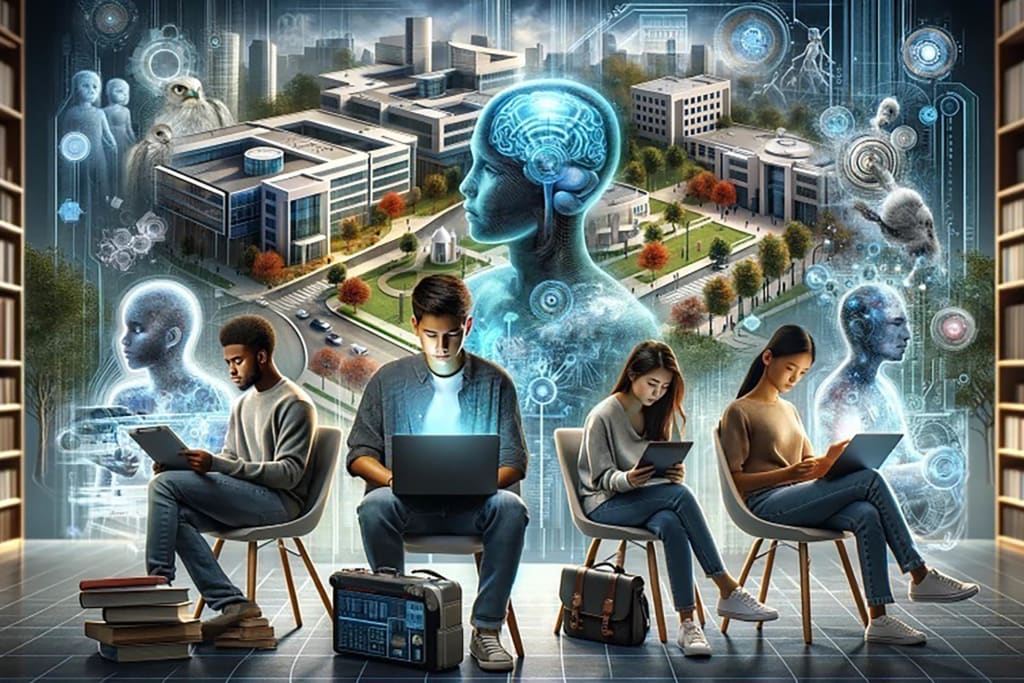"Navigating AI: A Beginner's Guide to Understanding Its Impact"
Beginners Guide to Artificial Intelligence

Introduction
As we enter the second decade of the 21st century, Artificial Intelligence (AI) has become an integral part of our daily lives. From virtual assistants like Alexa and Google Assistant, to self-driving cars and AI-powered healthcare diagnostics, the impact of AI is undeniable. With its roots dating back to the 1950s, AI has evolved from a niche field to a global phenomenon, with far- reaching implications for individuals, businesses, governments, and society as a whole.
What is Artificial Intelligence?
Artificial Intelligence refers to the development of computer systems that can perform tasks that typically require human intelligence, such as understanding language, recognizing images, making decisions, and solving problems. This definition encompasses a broad range of AI applications, from simple automation to complex decision-making. At its core, AI seeks to replicate human cognitive abilities, such as learning, reasoning, and problem-solving.
The History of Artificial Intelligence
The concept of AI dates back to ancient Greece, where myths about artificial beings created by gods existed. However, the modern study of AI began in the 1950s with the development of the first AI program, called Logical Theorist, which was designed to simulate human reasoning. This early work laid the foundation for the development of AI as a distinct field of research.
In the 1960s and 1970s, AI research continued to advance, with the development of expert systems that could mimic human decision-making processes. However, despite these advances, AI remained a niche field, with limited practical applications. It wasn't until the 1980s and 1990s that AI began to gain more widespread acceptance and attention, with the development of machine learning algorithms and the rise of the internet.
The Different Types of Artificial Intelligence
There are many different types of AI, each with its own unique characteristics and applications.
Some of the most common types of AI include:
Machine Learning:
Machine learning is a type of AI that involves training models on large datasets to make predictions or take actions. This subfield has seen significant advances in recent years, with the development of deep learning algorithms.
Deep Learning:
Deep learning is a subfield of machine learning that involves using neural networks to analyze data. This subfield has been instrumental in achieving state-of-the-art results in areas such as image recognition and natural language processing.
Natural Language Processing (NLP):
NLP is a type of AI that involves developing computer systems that can understand and generate human language. This subfield has seen significant advances in recent years, with the development of chatbots and virtual assistants.
Computer Vision:
Computer vision is a type of AI that involves developing computer systems that can interpret and analyze visual data from images and videos. This subfield has seen significant advances in recent years, with the development of self-driving cars and facial recognition technology.
Robotics:
Robotics is a type of AI that involves developing computer systems that can control physical robots to perform tasks. This subfield has seen significant advances in recent years, with the development of industrial robots and humanoid robots.
The Applications of Artificial Intelligence
AI has the potential to transform many aspects of our lives, with applications in:
Healthcare:
AI-powered diagnostic tools, personalized medicine, and disease prevention.
Finance:
AI-driven investment strategies, fraud detection, and automated trading systems.
Transportation:
Self-driving cars, route optimization, and traffic management.
Education:
AI-powered learning platforms, adaptive education, and personalized instruction.
Manufacturing:
AI-optimized supply chains, predictive maintenance, and quality control.
The Impact of Artificial Intelligence on Society
As AI becomes increasingly integrated into our daily lives, it has the potential to significantly impact society.
Some of the most significant implications include:
Job Market:
The rise of AI-powered automation could lead to widespread job displacement, particularly in industries where repetitive tasks are performed.
Economy:
AI-driven investments and innovations could lead to economic growth and increased productivity.
Social Relationships:
AI-powered social media platforms and virtual assistants could change the way we interact with each other.
Data Privacy:
The increasing reliance on AI-powered systems could raise concerns about data privacy and security.
Challenges in Implementing Artificial Intelligence
Despite its potential, implementing AI is not without its challenges.
Some of the most significant include:
Bias and Unintended Consequences:
AI systems can perpetuate biases present in the data they are trained on, leading to unintended consequences.
Regulation and Governance:
The development of effective regulations and governance structures is critical for ensuring the responsible deployment of AI.
Data Quality and Availability:
AI requires high-quality and abundant data to function effectively. This can be a challenge, particularly in industries with limited data availability.
Cybersecurity:
AI-powered systems are vulnerable to cyberattacks, which could have significant consequences.
The Future of Artificial Intelligence
As we continue to develop and deploy AI, it is essential that we consider the ethical implications of its development and deployment.
Some potential future developments include:
Explainability and Transparency:
Developing AI systems that can provide transparent explanations for their decisions and actions.
Human-AI Collaboration:
Fostering collaboration between humans and AI to improve decision-making and problem-solving.
AI-Powered Governance:
Developing AI-powered governance structures to ensure the responsible deployment of AI.
Conclusion
As we navigate the world of AI in 2024 and beyond, it is essential that we consider the ethical implications of its development and deployment. By educating people about AI, developing regulations to ensure responsible deployment, and fostering global collaboration, we can work together to harness the power of AI for the betterment of humanity.
About the Creator
HAFIZ WASAF
A seasoned tech writer with a passion for exploring the latest trends and developments in tech industry.






Comments (1)
https://vocal.media/writers/ladies-in-ai-intelligence-rep-dar-shun-kendrick-needs-to-pass-more-ai-intelligence